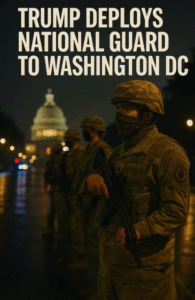On August 11, 2025, President Donald Trump initiated a significant federal intervention in Washington, D.C., deploying approximately 800 National Guard troops and federal law enforcement agents to address what he described as a “crime emergency” in the nation’s capital. This move marked an unprecedented assertion of presidential authority over local law enforcement.NBC4 Washington+8AP News+8The Guardian+8Reuters+1
Federalization of D.C. Police
President Trump invoked Section 740 of the District of Columbia Home Rule Act, temporarily placing the D.C. Metropolitan Police Department under federal control for up to 30 days. He emphasized that this action was necessary to combat rising crime and restore order in the city. The White House reported that over 100 arrests were made during the first two nights of the operation, with charges ranging from illegal firearm possession to assault. Additionally, several illegal firearms were seized during these operations. TIME+3Fox News+3The Daily Beast+3The Washington Post+3TIME+3The Guardian+3
Deployment of National Guard and Federal Agents
The deployment included approximately 800 National Guard troops and over 600 federal law enforcement officers from agencies such as the FBI, DEA, and U.S. Marshals. These personnel were tasked with patrolling streets, conducting traffic stops, and making arrests. While the National Guard’s role was primarily supportive, assisting in non-arrest functions and protecting federal properties, federal agents actively engaged in law enforcement activities. TIME+1
Political Reactions and Legal Considerations
The federalization of D.C.’s police force and the deployment of National Guard troops have sparked significant political debate. Critics, including D.C. Mayor Muriel Bowser, argue that crime rates in the city have been declining and that the federal intervention is an overreach of executive power. Some lawmakers have proposed legislation to repeal the president’s authority to take control of the D.C. police and to grant the city’s mayor authority over the National Guard. Forbes+11Fox News+11The Washington Post+11NBC4 Washington+3The Washington Post+3Indiatimes+3TIME+1
Implications for D.C. Autonomy
This intervention raises questions about the balance of power between federal and local authorities. The District of Columbia, unlike other U.S. cities, does not have full voting representation in Congress and is subject to federal oversight. The president’s actions have prompted discussions about the need for D.C. statehood and greater local control over its affairs. The Daily Beast
Future Outlook
The federal presence in Washington, D.C., is expected to continue for at least 30 days, with the possibility of an extension if Congress approves. The effectiveness of this intervention in reducing crime and its impact on the relationship between federal and local authorities will likely be subjects of ongoing debate and analysis.


